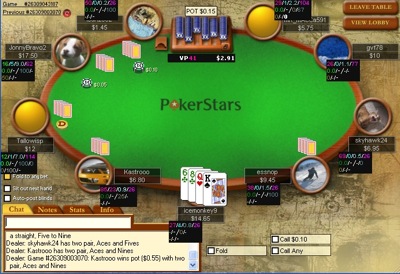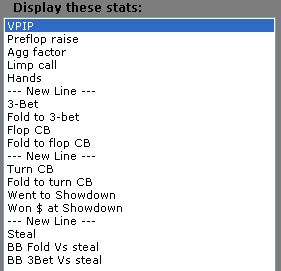Member Comments
No comments so far
 Omaha Manager is a new software tracking tool that imports hands from popular online poker rooms and keeps tabs on stats for players. The program works as both a stand-alone software solution and as an add-on for the already popular and widely used Holdem Manager. Highlights of Omaha Manager include support for all Omaha game types, the ability to have separate simultaneous Heads-Up Displays (HUDs) running for Hold’em and Omaha tables, and graphing features to show profits.
Omaha Manager is a new software tracking tool that imports hands from popular online poker rooms and keeps tabs on stats for players. The program works as both a stand-alone software solution and as an add-on for the already popular and widely used Holdem Manager. Highlights of Omaha Manager include support for all Omaha game types, the ability to have separate simultaneous Heads-Up Displays (HUDs) running for Hold’em and Omaha tables, and graphing features to show profits.
The HUD for Omaha games is a feature that isn't available in any other tracking program. This gives Omaha Manager a unique selling point against the competition that makes it an attractive all-in-one solution. However, even though many Hold'em players are accustomed to using an HUD and interpreting stats, very little has been done in the way of what an Omaha player uses.
We got in touch with a low-stakes Omaha regular who shared his HUD with us and broke down why he uses each stat. He wanted to stress that he's a low-stakes player who has been playing regularly for about five months and has been using the Omaha Manager HUD since the beta first launched. Below is a screenshot from within the Holdem Manager HUD "Preferences" screen. This shows all of the stats used and, as you can see, there are quite a few:

VPIP - This is one of the absolute basic stats you can have on a player. For low-stakes Omaha games, you'll find a polarized group of players. Some fit within the 20 to 30 range, while others will be in the 60 to 80 range. It'll be very apparent which group has a better understand of the game.
PFR - Again, one of the main stats. You'll see players who never raise with a number around 2, while others play a much looser game pre-flop and like to raise.
AF - This number is something I've been debating removing because it means so much less in Omaha than it does in Hold'em. Since there are so many draws, you'll see someone with an AF of 1.7; in Hold'em, this means this player is relatively passive. In Omaha, it can mean the player is smart with their draw calls and raises.
LC - It's great when you can spot a player who doesn't limp-call a lot because they'll limp in and you'll have position on them and make a raise. Then, they just give up.
Hands - Main stat. You need to know how many hands you have on a player.
3bet - There aren't too many 3bets in Omaha pre-flop at the low-stakes, whereas at the higher stakes, everyone 3bets regularly. This is sometimes a good indicator of a regular as opposed to a noob.
Fold to 3bet - Not a really important stat, but if you can find someone who folds a lot to 3bets, you can exploit that situation.
Flop Cbet - Getting Cbet stats on every street is important in knowing just how dedicated a player will be with their hand. Some guys will have a huge Flop Cbet number, but a miniscule one at the turn. These are the guys to float and represent hitting a draw against.
Fold to Flop Cbet - Many times, if you raise, you'll be auto-called by some 65/2 player in the blinds, so it's important to know if they give up easily on the flop or if they never fold.
Turn Cbet - Same logic as the Flop Cbet stat. You pretty much need to know how a player acts on different streets.
Fold to Turn Cbet - Fairly self-explanatory.
Went to Showdown - This is the best river stat that you can have in your HUD because you'll know if a player is able to give up on the river or if they always want to show down no matter what. If you have the nuts against this type of player (who goes to showdown way too often), you'll be able to value-town him all day long.
Won $ at Showdown - This isn't too important, but you'll find a lot of players with low numbers, meaning they've gone after some terrible draws or if they do hit one, they don't see the nuts coming.
Steal - This can be important if you see that a player's steal percentage is tremendously different than their PFR number. Then, you can immediately see that they are playing a lot of weak hands in this situation.
BB Fold vs Steal – If you plan to steal, you need to know how often someone will fold. A lot of times, this number isn't really important because loose blinds call anything.
BB 3bet to Steal – A good player will make life crappy by constantly raising your steal attempts. You have to know who these people are before making a decision to steal.
No comments so far